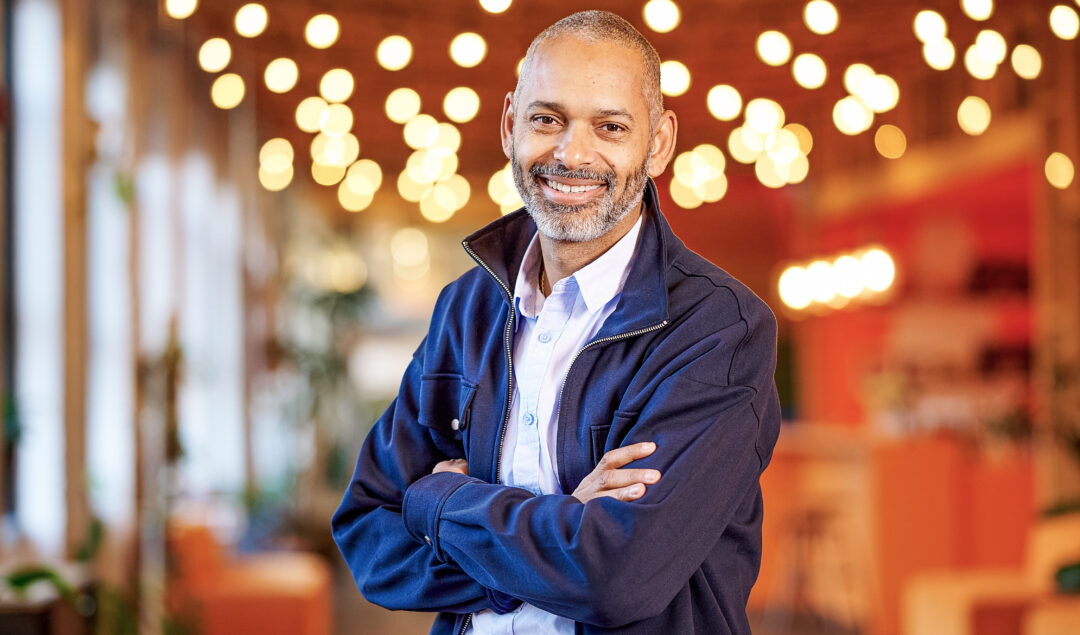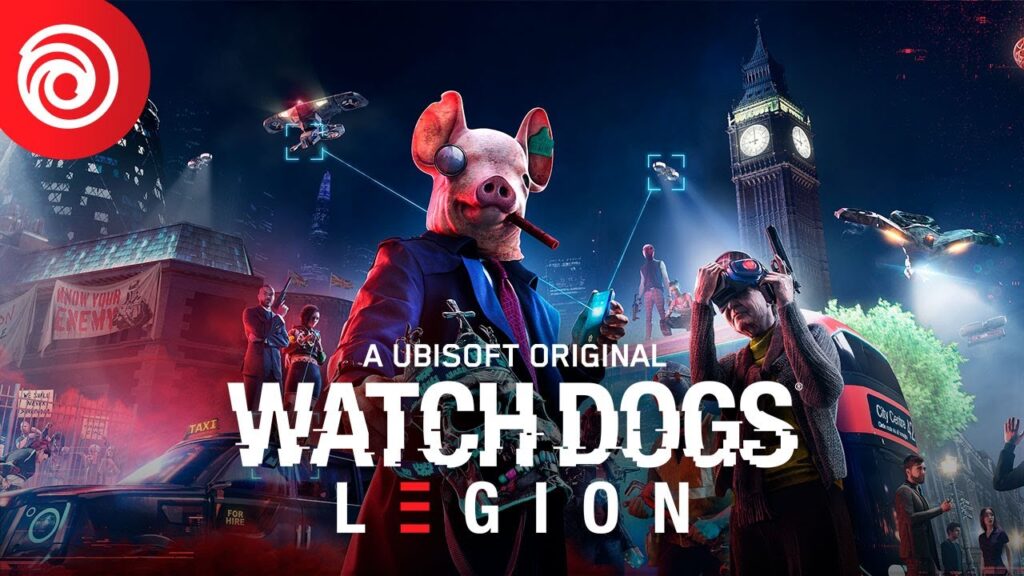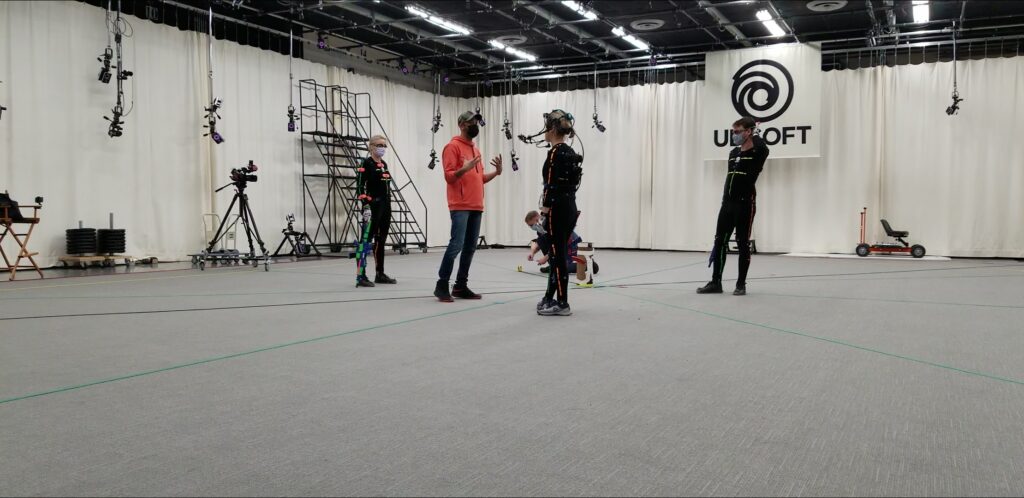Interview: Meet Richard Arroyo, The Ubisoft Creative Director With A Flair For Storytelling

Ubisoft is hiring on pocitjobs.com
Currently a Creative Director at Ubisoft, one of the world’s largest gaming developers, Richard Arroyo has spent almost a quarter of a century sharpening his professional tool kit. His experience ranges from computer animation design to business strategy and on-set direction, yet the US-born Montrealer insists he’s “still not done learning.”
In this interview, Richard sheds light on his decades-long career, the ethos that got him where he is now, and advice he would give those looking to follow in his footsteps.
What did your career journey look like?
My education started in computer programming. I used to build computers and was learning how to code, so one day, I spoke with one of the school councils about computer animation, and I fell in love. I started as an animator many years ago, in television and films—I was striving to become a Disney animator, an aspiration common to many new animators.
But Ubisoft made me fall in love with game development, because of the tech, collaboration with different departments, and also their ambition to be an industry leader.
I also started my directing career at Ubisoft, directing motion capture sets. I remember directing Target Game footage and game assets for Splinter Cell Conviction, sharing my approach to directing on the Rainbow Six shoot, and being sent to California to direct a [motion capture] shoot on my own for the very first time. I was probably between 25 and 27 years old, and my career really started to explode because of all the great opportunities that I crafted for myself. I wasn’t scared of doing anything difficult, and my career really grew because of that.

Then I left Ubisoft and went to California for six years. I spent a lot of time exchanging and learning from different artists and directors coming from DreamWorks, Disney, and other studios, which led to a partnership in creating the first online animation school focused on game animation development.
After expanding the school, I came back to Montreal and eventually became the animation studio director at Gameloft Montreal. I loved that because I was part of helping the studio grow, pitching to other major studios, working with the board and really advancing the business. But I felt it was too early working at studio level, something was missing, and I really wanted to go back on the front lines to direct a major AAA game.
So I let Ubisoft know that I was really hungry and ready. Then I worked on Watch Dogs: Legion and lots of other different projects that went really great before becoming a creative director.
How would you describe your animation style?
I use the term BBL when I’m directing because I like to make things that are bigger and better than life. When we’re watching a movie or playing a game, for the most part, we don’t want to be us right? We want to be this character. We want to do the impossible.
So, my style is always trying to create this branch that resonates with the audience so they can feel like they’re part of the adventure. I always like to make things exciting, believable, credible, and relatable in a fashion where it makes you dream and want to be there in that moment. So my style is flair with fun.
What is your experience in being a person of color at Ubisoft?
I like to let people focus on the task itself. That way they can see you; not what you’re wearing, not the color of your eyes or how your hair is super curly or whatever.
I’ve been doing this for 24 years, maybe even longer, and [I learnt that] things will be challenging, and you’re not always going to get the right opportunity or the fair opportunity. That’s why I believe that you [need to] craft your own future. I want people to see my talent, my skills, what I bring to the table, and I never really focused on my [skin] color.
My experience at Ubisoft is that they saw the talent, and they never questioned [my race]. If you don’t think there are a lot of people of color in the industry now, go back 24 years ago. I’ve always been a lone wolf in the industry, so instead of them focusing on me looking different, I always wanted them to focus on my expertise and me being a great guy to work with. That’s how I always dealt with it, and it helped me overcome all the challenges and being categorized. I never made [my race] the topic, I made the art, the talent, the skills or the task at hand the topic.
Fortunately, Ubisoft has been putting in place a lot of employee resource groups which have so many talented individuals and even inspired me along the way. We have a group for [employees in the] Asian Pacific Islander community, we have B.E.A.U. which stands for Black Employees at Ubisoft, UBIPROUD for the LGBTQIA2S+ community, among others. There are a lot of important initiatives that Ubisoft has been doing and anyone can participate and it’s really exciting.
What kind of support did you find the most valuable and advancing your career?
Mentorship. Even to this day, I still look for mentorship. The second thing is building a professional brain trust. At Ubisoft, I’ve created this professional relationship with other creative directors where we exchange ideas and advice. I like to work with them and see what I can learn and add to my skill set.

And then another is making sure that I have a team that wants to build each other up. If you create this culture where you build each other up, it is not only going to help your team. It’s also going to help you get better because then everyone is open to exchanging ideas, and they’re actually willing to help answer questions that you might not be able to answer.
Lastly, it’s working with a studio and a team that has the same vision, the same ambition, and the same passion as myself. If you all have the same goals, you’re actually in the right environment to succeed, and you can stay in that environment and grow throughout the years.
Is there any other advice that you would give to early-career animators of color hoping to one day be in your shoes?
Be ready. What I mean by ready is get your own skills, and don’t expect others to do the legwork for you. Create your own experience however you need to. Don’t expect school just to teach you everything you need if you want to grow and become the best version of you. Put in the time and dedication and be willing to understand that not everything is going to be fair. Be hungry. Dedicate yourself. Think of what your future self would say to you now. My philosophy is that you’ve got to own your own future.
What is it about the future of the games industry that excites you the most?
I think the industry is growing because storytelling is becoming more immersive, more engaging, and it resonates more than it did before. We’re actually crafting full worlds that you can immerse yourself into. We’re creating characters that you talk about. It’s more than just animation; it is gaming as a medium and gaming as entertainment. It is its own unique experience. And then if you go into VR well, that’s a whole ‘nother conversation to have.
This interview has been edited for brevity and clarity.
Ubisoft is hiring on pocitjobs.com



